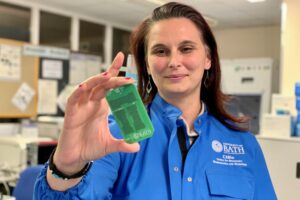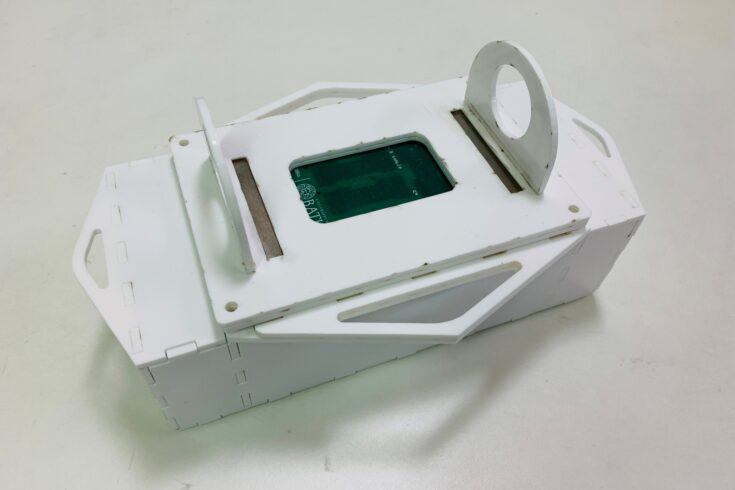About the project
The virus diagnoses test, that gives lab-quality results within minutes, has been invented by engineers at the University of Bath.
The prototype LoCKAmp device uses innovative ‘lab on a chip’ microchip technology, which has been proven to provide rapid and low-cost detection of COVID-19 from nasal swabs. The team is engaging with academic and commercial partners in the UK and US to develop the technology further for early cancer diagnosis and in preparation for the next pandemic (known as disease x) and are proceeding with clinical trials.
How it works
The LoCKAmp device works by quickly releasing and amplifying genetic material from a nasal swab sample by carrying out a chemical reaction to produce a result, which can be viewed on a smartphone app.
LoCKAmp employs the same ‘gold standard’ genetic-based testing techniques previously reserved for lab-based polymerase chain reaction (PCR) tests, which enables rapid testing at laboratory-scale standard for the first time in a portable format.
The LoCKAmp’s speed, as well as its accuracy, sets it apart. Results from the lab standard test, which sits in the palm of your hand, are shown within three minutes, compared to a rapid flow test currently taking up to 10 minutes. This makes LoCKAmp the fastest genetic testing device reported to date.
Impacts of the project
The device is made up with off-the-shelf components and factory-manufactured printed circuit boards. The prototype device can:
- be made quickly on a mass scale
- produced at a low cost
- present care providers and public health bodies around the world with an effective new tool in virus detection
Dr Despina Moschou, from the University of Bath’s Centre for Bioengineering & Biomedical Technologies, who led the research, says:
We started researching and developing LoCKAmp during the second wave of COVID-19 in the UK. We were confident we could create a portable, low-cost device that could carry out genetic identification of the virus, like a PCR test, within 10 minutes.
We have done this but have discovered results can be received within three minutes of taking the test. This is an amazing display of the possibilities of ‘lab on a chip’ technology and given the low cost and adaptability of the technology to detect a range of conditions, a potentially highly valuable and unique tool for a range of healthcare settings.

Dr Despina Moschou with the LoCKAmp replaceable ‘lab on a chip’ printed circuit board. Credit: University of Bath
The team is already engaging with academic and commercial partners interested in the scientific outcomes but would welcome further approaches as they seek to bring LoCKAmp into production. They say a commercial partner with the relevant design and manufacturing expertise could quickly redesign the LoCKAmp into a small, portable device which has great potential for use in remote healthcare settings.
By using readily available printed circuit board technology and the associated mass manufacturing infrastructure, the team say the device can be produced quickly and cheaply at scale. LoCKAmp comprises of a portable testing unit and disposable cartridges, which are used for each test. Each testing unit is projected to cost as little as £50 when it reaches mass production, while the test cartridges, currently made for £2.50, could cost less than £0.50.
Future research
The device exhibits remarkable adaptability and potential, LoCKAmp could also be used to carry out anonymised community-level monitoring and detection of viruses like COVID-19, by testing wastewater.
This alternative use, which requires some pre-processing of wastewater samples, was discovered as the team took advantage of expertise in wastewater-based epidemiology within Bath’s Water Innovation Research Centre.
By using LoCKAmp to carry out ongoing, real-time analysis of wastewater can give a broader community-wide view, rather than relying on individuals to regularly test for a condition.
Professor Barbara Kasprzyk-Hordern, from the University of Bath’s Department of Chemistry and Institute for Sustainability, is an expert in environmental epidemiology and contributed to the research. She says:
With LoCKAmp technology providing both low cost and real time genetic target identification and quantification, we’re getting ever closer to real time pathogen tracking. This opens exciting opportunities enabling the establishment of early warning systems utilising wastewater for pathogen surveillance in communities.
This project was funded through the UK Research and Innovation Global Challenges Research Fund QR and an Engineering and Physical Sciences Research Council Impact Acceleration Account.
Further info
You can read more about the device and how it works in a detailed research paper which was published in the journal Lab on a Chip.
Top image: Prototype LoCKAmp device. Credit: University of Bath

